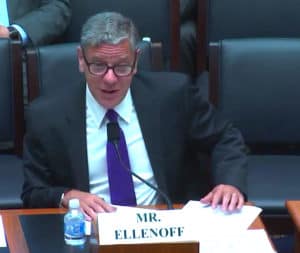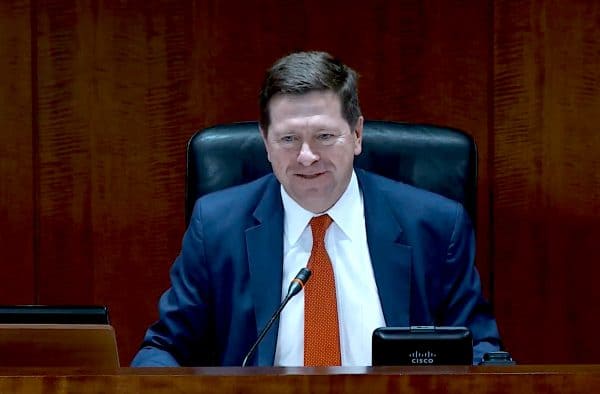The Securities and Exchange Commission (SEC) proposed meaningful changes to multiple securities exemptions today. The pending rule change came following a closed meeting of the Commission without a public agenda. The proposals may dramatically impact platforms that facilitate online securities offerings and benefit smaller companies that seek to raise capital.
Among the proposed changes, the SEC seeks to increase Reg CF from its current $1.07 million funding cap to $5 million and Reg A+ (Tier 2) to $75 million. Rule 504 of Reg D also received attention as it was bumped up to $10 million.
SEC Chairman Jay Clayton issued the following statement on the news:
“Emerging companies, from early-stage start-ups seeking seed capital to companies that are on a path to become a public reporting company, use the exempt offering rules to access critical capital needed to create jobs and scale their businesses. The complexity of the current framework is confusing for many involved in the process, particularly for those smaller companies whose limited resources spent on navigating our overly complex rules are diverted from direct investments in the companies’ growth. These proposals are intended to create a more rational framework that better allows entrepreneurs to access capital while preserving and enhancing important investor protections.”
The updates are part of a broader review by the SEC that is incorporated in an ongoing “concept release” attempting to harmonize a somewhat convoluted regulatory environment for private securities that currently creates challenges for smaller companies aiming to raise capital while remaining compliant.
The Commission’s proposals previously received broad support from public commentary. In fact, many industry participants were seeking higher funding caps – especially with Reg CF (Regulation Crowdfunding) a securities exemption that has suffered under unwieldy rules that have undermined capital formation for the very firms it was created to help.
The SEC said the proposed rule changes were in line with its stated mission of assessing the capital raising framework as a whole and improving it for the benefit of investors, entrepreneurs, and more seasoned issuers.
 Doug Ellenoff, the Managing Partner at the law firm of Ellenoff, Grossman and Schole and Counsel to the Association of Online Investment Platforms (AOIP), shared the following comment:
Doug Ellenoff, the Managing Partner at the law firm of Ellenoff, Grossman and Schole and Counsel to the Association of Online Investment Platforms (AOIP), shared the following comment:
“I am very encouraged by the SEC’s efforts and initiatives to simplify the ever complex exempt offering exemptions and examine and make recommendations on how to streamline what amounts to a confusing series of rules enacted over decades,” stated Ellenoff. “In particular, I am extremely pleased that the SEC is seeking to increase the caps on both Regulation CF and Regulation A+. This recommendation validates all of the hard work and effort of so many people that have been tirelessly implmenting the provisions of the JOBS Act to make it into a viable industry.”
The JOBS Act was the law that legalized online capital formation or investment crowdfunding.
 Youngro Lee, the Chairman of AOIP and CEO of NextSeed – a securities crowdfunding platform, lauded the proposed rule change:
Youngro Lee, the Chairman of AOIP and CEO of NextSeed – a securities crowdfunding platform, lauded the proposed rule change:
“These proposals to improve the exempt offering framework will be extremely helpful to main street entrepreneurs and investors. Over the past several years the SEC has worked very hard to understand the rapidly changing dynamics of private capital markets, and these proposals clearly reflect a genuine effort to guide our capital markets in a positive direction for all participants.”
The Founding Members of AOIP have been working diligently with policymakers to improve the ecosystem for private securities offerings. Multiple trips to Washington, DC, including meetings with elected officials as well as securities regulators, have sought to educate and advocate on behalf of both issuers and the platforms. Lee is a member of the SEC’s Small Business Capital Formation Advisory Committee, a group that has supported some of the above changes.
Additionally, the Commission’s proposal addressed several other serious pain points for issuers seeking to leverage these exemptions.
For Reg CF, the Commission aims to amend the investment limits for investors in these offerings by not applying any investment limits to accredited investors. As well, the Commission proposes revising the calculation method for investment limits for non-accredited investors to allow them to rely on the greater of their annual income or net worth when calculating the limit on how much they can invest.
Reg CF will also benefit from “Testing the Waters” a characteristic currently utilized under Reg A+, a rule that enables issuers to measure investor demand before spending tens of thousands of dollars on an actual offering.
Special Purpose Vehicles (or SPVs) may now be included in Reg CF offers thus potentially improving the viability of the exemption while providing greater investor protection.
The Commission also outlined an integration framework as to how issuers may leverage a mixture of the rules.
Prior to approval, there will be a public comment period for the proposed rule amendments that will remain open for 60 days following publication of the release in the Federal Register.
A Fact Sheet is republished below along with the amendments.
Facilitating Capital Formation and Expanding Investment Opportunities by Streamlining Access to Capital for Entrepreneurs
March 4, 2020
The Securities and Exchange Commission today proposed a set of amendments to the exemptive framework under the Securities Act of 1933 that would simplify, harmonize, and improve certain aspects of the framework to promote capital formation while preserving or enhancing important investor protections.
The proposed amendments would:
-
- address, in one broadly applicable rule, the ability of issuers to move from one exemption to another, and ultimately to a registered offering, providing more certainty to issuers raising capital;
- increase the offering limits for Regulation A, Regulation Crowdfunding, and Rule 504 offerings, and revise certain individual investment limits based on the Commission’s experience with the rules, marketplace practices, capital raising trends, and comments received;
- provide greater certainty to issuers and protection to investors by setting clear and consistent rules governing offering communications between investors and issuers, including permitting certain “demo day” activity without running afoul of the prohibition on general solicitation; and
- harmonize certain disclosure and eligibility requirements and bad actor disqualification provisions to reduce differences between exemptions, while preserving or enhancing investor protections.
An updated summary chart of the offering exemptions is included at the end of this fact sheet for reference.
Background
A majority of entrepreneurs and emerging businesses raise capital using the exempt offering framework under the Securities Act, from raising seed capital for new business to funding growth on the path to an initial public offering. The scope of exempt offerings has evolved over time through legislative changes and Commission rules, resulting in a current offering framework that is complex and made up of differing requirements and conditions for exemption, which may be confusing and difficult for issuers to navigate. In June 2019, the Commission issued a concept release that solicited public comment on possible ways to simplify, harmonize, and improve the exempt offering framework under the Securities Act. Informed by the comments received, as well as other feedback including recommendations of the Commission’s advisory committees, the SEC’s Government-Business Forum on Small Business Capital Formation, direct outreach to, and engagement with, investors and entrepreneurs, and Congressional feedback, the Commission’s proposed amendments are intended to reduce potential friction points to make the capital raising process more effective and efficient to meet evolving market needs.
Highlights
Offering and Investment Limits. The Commission proposed revisions to the current offering and investment limits for certain exemptions.
For Regulation A:
-
- raise the maximum offering amount under Tier 2 of Regulation A from $50 million to $75 million; and
- raise the maximum offering amount for secondary sales under Tier 2 of Regulation A from $15 million to $22.5 million.
For Regulation Crowdfunding:
-
- raise the offering limit in Regulation Crowdfunding from $1.07 million to $5 million;
- amend the investment limits for investors in Regulation Crowdfunding offerings by:
- not applying any investment limits to accredited investors; and
- revising the calculation method for investment limits for non-accredited investors to allow them to rely on the greater of their annual income or net worth when calculating the limit on how much they can invest.
For Rule 504 of Regulation D:
-
- raise the maximum offering amount from $5 million to $10 million.
“Test-the-Waters” and “Demo Day” Communications. The Commission proposed several amendments relating to offering communications, including:
-
- a proposed new rule that would permit an issuer to use generic solicitation of interest materials to “test-the-waters” for an exempt offer of securities prior to determining which exemption it will use for the sale of the securities;
- a proposed rule amendment that would permit Regulation Crowdfunding issuers to “test-the-waters” prior to filing an offering document with the Commission in a manner similar to current Regulation A; and
- a proposed new rule that would provide that certain “demo day” communications would not be deemed general solicitation or general advertising.
Regulation A and Regulation Crowdfunding Eligibility. The proposal includes amendments to the eligibility restrictions in Regulation Crowdfunding and Regulation A. These proposed rules would permit the use of certain special purpose vehicles to facilitate investing in Regulation Crowdfunding issuers, and would limit the types of securities that may be offered and sold in reliance on Regulation Crowdfunding.
Integration Framework. The current Securities Act integration framework for registered and exempt offerings consists of a mixture of rules and Commission guidance for determining whether multiple securities transactions should be considered part of the same offering.
The Commission proposed changes to the framework to better facilitate this determination by providing a general principle of integration that looks to the particular facts and circumstances of the offering, and focuses the analysis on whether the issuer can establish that each offering either complies with the registration requirements of the Securities Act, or that an exemption from registration is available for the particular offering.
The Commission also proposed four non-exclusive safe harbors from integration:
|
Safe Harbor 1 |
Any offering made more than 30 calendar days before the commencement of any other offering, or more than 30 calendar days after the termination or completion of any other offering, would not be integrated with another offering; provided that, for an exempt offering for which general solicitation is not permitted, the purchasers either were not solicited through the use of general solicitation, or established a substantive relationship with the issuer prior to the commencement of the offering for which general solicitation is not permitted. |
|
Safe Harbor 2 |
Offers and sales made in compliance with Rule 701, pursuant to an employee benefit plan, or in compliance with Regulation S would not be integrated with other offerings. |
|
Safe Harbor 3 |
An offering for which a Securities Act registration statement has been filed would not be integrated with another offering if made subsequent to: (i) a terminated or completed offering for which general solicitation is not permitted; (ii) a terminated or completed offering for which general solicitation is permitted and made only to qualified institutional buyers and institutional accredited investors; or (iii) an offering that terminated or completed more than 30 calendar days prior to the commencement of the registered offering. |
|
Safe Harbor 4 |
Offers and sales made in reliance on an exemption for which general solicitation is permitted would not be integrated with another offering if made subsequent to any prior terminated or completed offering. |
Other Improvements to Specific Exemptions. The amendments also would:
-
- change the financial information that must be provided to non-accredited investors in Rule 506(b) private placements to align with the financial information that issuers must provide to investors in Regulation A offerings;
- add a new item to the non-exclusive list of verification methods in Rule 506(c);
- simplify certain requirements for Regulation A offerings and establish greater consistency between Regulation A and registered offerings; and
- harmonize the bad actor disqualification provisions in Regulation D, Regulation A, and Regulation Crowdfunding.


